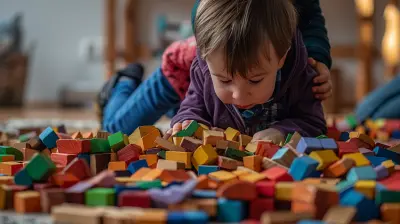7 March 2025
If I could give you one tool that could drastically change your life, both personally and professionally, would you take it? Imagine having the ability to not only understand your own emotions but also to manage them in a way that strengthens your relationships, improves your decision-making, and boosts your overall well-being. Sounds like a superpower, right? Well, it’s not some unattainable gift; this is emotional intelligence (EI), and the best part? You can develop it.
In this article, we’re going to explore the ins and outs of emotional intelligence and how you can cultivate it to achieve greater self-understanding. Grab a cup of coffee, settle in, and let's dive into this fascinating topic.

What is Emotional Intelligence?
Before we get into the nitty-gritty of how to develop emotional intelligence, let’s first define what it actually is. Emotional intelligence is the ability to recognize, understand, manage, and influence your own emotions and those of others. It’s like having a GPS for your emotional world—guiding you through life’s ups and downs, helping you to navigate relationships, and allowing you to make more thoughtful decisions.Daniel Goleman, a psychologist and best-selling author, popularized the concept of emotional intelligence in the 1990s. According to Goleman, EI encompasses five key components:
1. Self-awareness – Recognizing your own emotions and how they affect your thoughts and behaviors.
2. Self-regulation – Learning how to control your emotional responses rather than letting them control you.
3. Motivation – Being driven by internal desires rather than external rewards.
4. Empathy – Understanding and sharing the feelings of others.
5. Social skills – Managing relationships effectively and building rapport.
Now that we have an understanding of what emotional intelligence is, let's move on to why it’s so crucial for self-understanding.

Why Emotional Intelligence is Key to Self-Understanding
Think of emotional intelligence as the foundation for developing a deeper sense of self-awareness. When you understand your emotions, you gain insights into the “why” behind your actions and behaviors. You start connecting the dots between your feelings and your reactions, which leads to greater self-understanding.For instance, have you ever found yourself snapping at someone for no apparent reason? Later, you might realize that something completely unrelated—like a tough day at work—was the actual trigger. Emotional intelligence helps you catch these moments in real-time, giving you the ability to respond thoughtfully instead of reacting impulsively.
By fostering emotional intelligence, you can learn to:
- Identify and manage emotional triggers – You won’t be caught off-guard by your emotions.
- Improve your relationships – Both personal and professional interactions will benefit as you become more attuned to your emotions and the emotions of others.
- Make better decisions – When you’re in control of your emotions, you can think more clearly and make more rational choices.
- Reduce stress – Managing your emotions effectively can help you stay calm and composed, even in challenging situations.
Developing emotional intelligence is like having a personal guide for how to act and react in a more mindful and constructive way. So, how exactly do you cultivate this skill?

Steps to Developing Emotional Intelligence
1. Practice Self-Awareness
Self-awareness is the cornerstone of emotional intelligence. It all starts with understanding your own emotions, why you feel the way you do, and how those emotions influence your thoughts and actions.To get better at self-awareness, try these tips:
- Keep an emotion journal: Write down your feelings throughout the day, along with any events or thoughts that triggered them. Over time, you’ll start to notice patterns.
- Ask for feedback: Sometimes, we’re too close to our own emotions to see things clearly. Ask trusted friends or family members for their perspective on how you handle emotions.
- Meditate: Mindfulness meditation can help you become more attuned to your emotional landscape. It’s like hitting the pause button on your thoughts and feelings to observe them without judgment.
2. Learn to Self-Regulate
Once you’ve mastered self-awareness, the next step is self-regulation. This means learning how to control your emotions rather than letting them control you. It’s important to remember that self-regulation doesn’t mean suppressing your emotions. Instead, it’s about managing them in a way that’s healthy and constructive.Here’s how you can improve self-regulation:
- Pause before reacting: The classic “count to ten” trick really works. Giving yourself a moment to process emotions before responding can prevent you from saying or doing something you’ll regret.
- Reframe your thoughts: Instead of thinking, “This situation is terrible,” try asking yourself, “What can I learn from this?” Shifting your mindset can help you manage negative emotions.
- Practice deep breathing: When emotions run high, your body reacts by increasing your heart rate and tensing up. Deep, slow breathing can calm your nervous system and give you a moment to regain control.
3. Cultivate Empathy
Empathy is the ability to put yourself in someone else’s shoes and understand their feelings. While it’s often considered a social skill, empathy is also essential for self-understanding. By seeing things from another person’s perspective, you can gain a better understanding of your own emotions and responses.To build empathy:
- Listen actively: When someone is talking, don’t just wait for your turn to speak. Really listen to what they’re saying, and try to understand their emotions.
- Practice perspective-taking: When you’re in a disagreement, take a moment to consider the other person’s point of view. You might find that understanding their perspective helps you manage your own emotional response.
- Read emotional cues: Pay attention to body language and tone of voice. These non-verbal signals can give you insight into how others are feeling.
4. Boost Your Motivation
Motivation in the context of emotional intelligence isn’t just about chasing goals. It’s about having a sense of purpose and being driven to improve yourself, even when things get tough. People with high emotional intelligence are often motivated by internal factors—like personal growth—rather than external rewards like money or recognition.To enhance your motivation:
- Set personal goals: Having a clear sense of what you want to achieve can help you stay focused and driven.
- Celebrate small wins: Don’t wait for the big achievements to acknowledge your progress. Celebrate the small victories along the way.
- Stay positive: People with high emotional intelligence tend to have an optimistic outlook. Focus on what’s possible rather than dwelling on setbacks.
5. Develop Social Skills
While social skills may seem like a “bonus” in the emotional intelligence toolkit, they’re actually critical for self-understanding. Why? Because interacting with others can reveal a lot about your own emotions and how you handle them.Improve your social skills by:
- Building rapport: Take the time to get to know people and genuinely connect with them. Strong relationships can provide important emotional feedback.
- Resolving conflicts: Instead of avoiding disagreements, learn how to navigate them calmly and constructively.
- Communicating clearly: Express your emotions and thoughts honestly, but also be mindful of how you come across to others.

The Benefits of Emotional Intelligence
So why go through all the effort to build emotional intelligence? Because the rewards are immense. Here’s what you stand to gain:1. Improved Relationships
Whether it’s with your partner, friends, or co-workers, emotional intelligence can help you build stronger, more meaningful relationships. When you’re more attuned to your emotions—and those of others—you’re better equipped to navigate the complexities of human interaction.2. Better Mental Health
Emotional intelligence allows you to manage stress, anxiety, and other negative emotions more effectively. By developing healthier emotional habits, you can improve your mental well-being and resilience.3. Enhanced Problem-Solving Skills
With emotional intelligence, you’re less likely to be clouded by emotions when making decisions. This clarity allows for better problem-solving and more thoughtful decision-making.4. Greater Self-Confidence
As you become more in tune with your emotions and learn how to manage them effectively, your self-confidence will naturally grow. You’ll feel more in control of your life, which leads to a stronger sense of self-worth.5. Increased Professional Success
Emotional intelligence is a key factor in leadership and job performance. People who are emotionally intelligent tend to excel in roles that require teamwork, communication, and leadership.Wrapping It Up
Developing emotional intelligence is like unlocking a new level of self-awareness and self-understanding. It’s not a quick fix, but with time and practice, you’ll start to see the benefits in every aspect of your life—from your relationships to your decision-making, and even your mental health.So, what’s the next step? Start small. Practice mindfulness, pay attention to your emotions, and work on building empathy with others. The more you invest in developing your emotional intelligence, the more you’ll understand yourself—and that’s priceless.









Daisy Summers
Emotional intelligence: the key to unlocking your inner self and mastering life's complexities.
April 5, 2025 at 2:57 PM